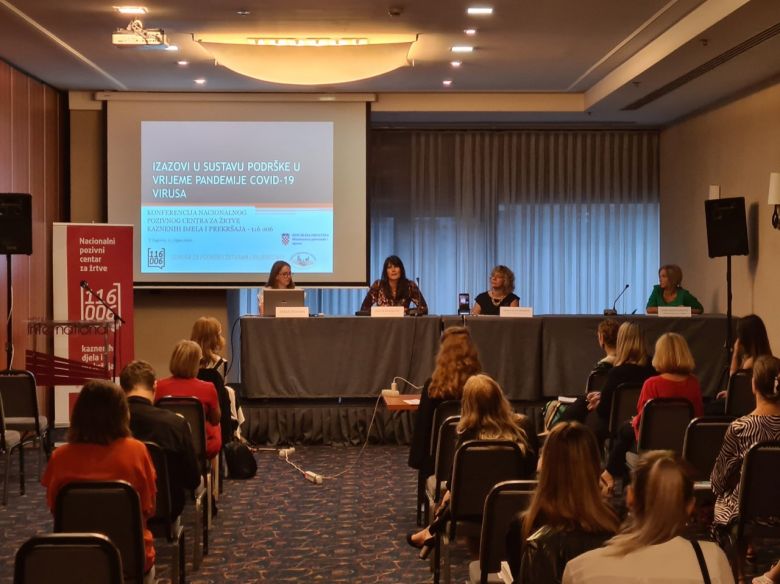
News from Croatia: Conference “Challenges in the victim support system during the pandemic”
On Thursday, 17th of September, The Victim and Witness Support Service in Croatia held a conference „Challenges in the victim support system during the COVID – 19 pandemic“ in Zagreb.
The conference was held to mark the fourteenth birthday of The Victim and Witness Support Service and the seventh birthday of The National Call Center for Victims of Crime – 116 006 helpline that is anonymous, free of charge and which provides victims with legal and practical information, emotional support and contacts of other relevant institutions and organisations.
The aim of the conference was to bring together different stakeholders in the victim support system in order to exchange experiences on challenges and solutions adopted during the COVID – 19 pandemic and in the period of recovery from earthquake which hit Zagreb in March in order to
ensure continuous support to victims and witnesses.
Speakers at the conference were employees of different institutions or civil society organisations that deal with victims and witnesses and who gave their own perspective on providing different forms of support to victims in these challenging times.
Miren Špek, Executive Director of The Victim and Witness Support Service, and Vedrana Šimundža-Nikolić, Assistant to Minister of Justice and Administration, greeted the participants with an introductory speech
The coordinator of National Call Center for Victims of Crime, Maja Štahan, presented the activities of the National Call Center, the challenges it has faced in the past six months and the ways in which the reorganisation of work has ensured continuous work of 116 006 helpline.
Coordinator Ivana Andrijašević briefly explained what consequences a crisis situation, such as this, can have on our mental health.
Anita Matijević, head of the Department for Juvenile Delinquency at the Ministry of Internal Affairs, held a lecture in which she emphasised that the training of police officers continued despite the pandemic. Matijević also presented the statistics of reported crimes, stating that in relation to the last year, there is a decrease in total reports of criminal offenses but an increase in domestic violence reports of 40%. Drenka Kovač Narančić, Deputy Municipal State Attorney at the Municipal State Attorney’s Office in Velika Gorica, presented the work of the State Attorney’s Office during the pandemic, pointing out the use of audio-video device as a means of communication with victims and witnesses.
Jasna Zoretić Rendulić, a judge authorized to perform the tasks of court administration, gave an overview of the changes in the Municipal Criminal Court which were in large part caused by the earthquake. Zoretić Rendulić especially emphasised the benefits of having a Department for Victim
and Witness Support in courts, concluding hopefully that the Municipal Criminal Court in Zagreb could soon have its own Department.
Nikica Hamer Vidmar, Head of the Victim and Witness Support Service at the Ministry of Justice and Administration, presented the work of the Service but also commented on the work of the Victim and Witness Support Department at seven county courts in Croatia. Hamer Vidmar pointed out that during the pandemic all communication with victims and witnesses took place by telephone, emphasising the difficulties in providing emotional support that way. Most of the Department’s activities were carried out on a smaller scale, especially escorts to court.
Estera Bašić from safe house Duga in Zagreb described the work of the safe house during the pandemic and pointed out a number of challenges they faced in an effort to provide safe accommodation for new users, but also to protect the health of existing residents. Bašić especially emphasised the lack of clear and up-to-date instructions on organising the work of safe houses,
concluding that they are currently extremely vulnerable to the virus because the instructions they now work by date from a period when there was a much better epidemiological situation in Croatia.
The last speaker at the conference was Anamaria Drožđan-Kranjčec, head of the legal team at Women’s Room. The Women’s Room is the leader of the Network of Support an Cooperation for Victims of Crime that provides support to victims in counties where Victim and Witness Support
Departments at county courts don’t exist. In her presentation, Drožđan-Kranjčec reviewed the challenges faced in the past period, but also emphasized the flexibility of civil society organisations,
praising all organizations in the Network for effective adaptation and continuous work, even during lockdown.
After a short discussion, the coordinator of the National Call Center, Maja Štahan, closed the conference concluding that a number of changes were implemented by the system to make it more accessible to victims. Štahan emphasised that civil society organisations have a flexibility in adapting
to different situations that institutions usually don’t.
Although efforts to ensure continuous support were made, Štahan pointed out that in the process of the system adapting to new circumstances it has sometimes been detrimental to victims and their rights. Štahan concluded with encouraging everyone to think better about how to adapt their work to make it continuously available to all victims in need.
